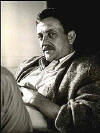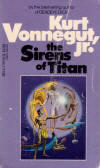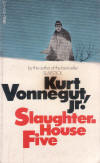 Sharing
a birth date with another of the world's most popular literary figures,
Fyodor Dostoevsky, is an American pop icon, Kurt
Vonnegut Jr. Born in Indianapolis, Indiana, on November 11, 1922,
Vonnegut was the youngest of the
three children of Edith and Kurt Vonnegut. He is the author of numerous novels,
including Cat's Cradle (1963), Hocus Pocus (1990), and Timequake (1997).
Sharing
a birth date with another of the world's most popular literary figures,
Fyodor Dostoevsky, is an American pop icon, Kurt
Vonnegut Jr. Born in Indianapolis, Indiana, on November 11, 1922,
Vonnegut was the youngest of the
three children of Edith and Kurt Vonnegut. He is the author of numerous novels,
including Cat's Cradle (1963), Hocus Pocus (1990), and Timequake (1997).
Vonnegut's family is of
German descent, and both of his parents spoke German in their home, although
they refused to teach the language to their son. Vonnegut was born at
a time after World War I when many Americans still considered Germany to be
evil. Vonnegut said, "[My parents] volunteered to make me ignorant and
rootless as proof of their patriotism."
Vonnegut's
vision of the fantastic as it occurs in everyday life was influenced by a
series of tragic events as a young man. His mother committed suicide on
Mother's Day in 1944 while Vonnegut was home on leave. He survived the
bombing of Dresden, which killed nearly everyone else. He lost his sister,
Alice, to cancer within hours of her husband's death in a train crash. As a
result, Vonnegut’s fiction shows an author struggling to cope within a world
of tragicomic disparities, a universe that defies plausibility, and whose
absurdity becomes food for reality.
When Vonnegut
completed high school, his father forced him to go to college to study
biochemistry against his son’s will. Vonnegut wanted to be a journalist.
He said, "[College] was a boozy dream, partly because of booze itself, and
partly because I was enrolled exclusively in courses I had no talent for."
Before long,
he found himself failing most of his classes when providence struck. Japan
bombed Pearl Harbor, offering Vonnegut the perfect opportunity to escape
school and join the military.
 In December 1944, Vonnegut was captured by the Germans at the Battle
of the Bulge. He was imprisoned in a slaughterhouse in Dresden, Germany,
and forced to work in a factory that manufactured food supplements for
pregnant women. Allied bombers attacked the city on the night of
February 13,
1945,
setting off a firestorm that burned up the oxygen and killed nearly all of
the city’s residents within hours. Vonnegut and his fellow prisoners
survived because they slept in a meat locker three stories belowground.
When they went outside the following morning, they found themselves among
few people left alive in a city that had burned to the ground.
In December 1944, Vonnegut was captured by the Germans at the Battle
of the Bulge. He was imprisoned in a slaughterhouse in Dresden, Germany,
and forced to work in a factory that manufactured food supplements for
pregnant women. Allied bombers attacked the city on the night of
February 13,
1945,
setting off a firestorm that burned up the oxygen and killed nearly all of
the city’s residents within hours. Vonnegut and his fellow prisoners
survived because they slept in a meat locker three stories belowground.
When they went outside the following morning, they found themselves among
few people left alive in a city that had burned to the ground.
Following the
war, Vonnegut began publishing fiction about the dangers of technology, but
since his work contained elements of fantasy, he was quickly labeled a
science fiction writer, and his works were not taken seriously. He said, "I
have been a sore-headed occupant of a file drawer labeled 'Science
Fiction'...and I would like out, particularly since so many serious critics
regularly mistake the drawer for a urinal."
 It’s easy to
understand the sci-fi label. Vonnegut’s first published novel, Player Piano,
depicts a fictional city called Ilium in which the people have surrendered
all control of their lives to a computer named, ironically enough, EPICAC,
after a substance that induces vomiting. The Sirens of Titan (1959)
takes place on several different planets, including a thoroughly militarized
Mars, where the inhabitants are controlled electronically.
It’s easy to
understand the sci-fi label. Vonnegut’s first published novel, Player Piano,
depicts a fictional city called Ilium in which the people have surrendered
all control of their lives to a computer named, ironically enough, EPICAC,
after a substance that induces vomiting. The Sirens of Titan (1959)
takes place on several different planets, including a thoroughly militarized
Mars, where the inhabitants are controlled electronically.
Although
obvious sci-fi venues, the super-real settings of Vonneguts fictional worlds serve
primarily as a metaphor for modern society, which Vonnegut views as absurd
to the point of being surreal, as well as a world peopled by the hapless
human beings who struggle against both their environments and themselves.
In Player
Piano, the protagonist, Dr. Paul Proteus, revolts against the vacuous
emotions of a society in which the people, freed from the need to perform
any meaningless work, lose all sense of purpose. Proteus joins an
underground movement dedicated to overthrowing the computer-run government
and takes part in a failed revolution. Although he is imprisoned at the end
of the novel, he has triumphed in regaining his humanity.

In
God Bless You, Mr. Rosewater; or, Pearls before Swine
(1965), Vonnegut introduces one of his most endearing characters in Eliot
Rosewater, a philanthropic but ineffectual man who tries to use an inherited
fortune for the good of humanity. He soon learns, though, that his
generosity, his concern for humanity, and his attempts to reach out to his
fellow human beings are looked at as madness by a money-conscious society.
The novel takes pot shots at everyone, including organized religion,
suggesting that the keepers of the faiths use religious doctrine to justify
and maintain their power over others.
While writing
these early books, Vonnegut kept trying to work on a novel about the bombing
of
Dresden.
Finally, in 1967, he published Slaughterhouse-Five (1969) about a
man named Billy Pilgrim who experiences the bombing of Dresden and loses his
mind, thinking that he has been transported to a planet where time no longer
exists.
Vonnegut said,
"[I knew] after I finished Slaughterhouse-Five that I didn't have
to write at all anymore if I didn't want to...I suppose that flowers, when
they're through blooming, have some sort of awareness of some purpose having
been served."
 Slaughterhouse-Five
was published at the height of the War in Vietnam, and antiwar protestors
saw the author as a hero and a powerful spokesperson. Vonnegut called the
work an anti-war book, although he downplayed its influence on society,
saying, "Anti-war books are as likely to stop war as anti-glacier books are
to stop glaciers." He has since become one of the most popular guest
lecturers at universities across the country.
Slaughterhouse-Five
was published at the height of the War in Vietnam, and antiwar protestors
saw the author as a hero and a powerful spokesperson. Vonnegut called the
work an anti-war book, although he downplayed its influence on society,
saying, "Anti-war books are as likely to stop war as anti-glacier books are
to stop glaciers." He has since become one of the most popular guest
lecturers at universities across the country.
Kurt Vonnegut
said, "We would be a lot safer if the government would take its money out of
science and put it into astrology and the reading of palms...only in
superstition is there hope. If you want to become a friend of civilization,
then become an enemy of the truth and a fanatic for harmless balderdash."
Vonnegut suffered irreversible brain injuries following a fall at his home and died in
Manhattan on April 11, 2007.










